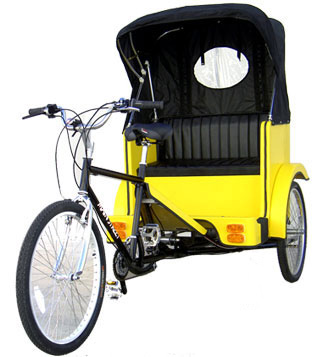DeletedUser
A rickshaw is a pedicab. Just to clarify... 
[spoil]THIS ladies and gents is a pedicab/rickshaw-

[/spoil]
Where i'm from, the Rickshaw is not really that common at all.
We have just 5 in my city and I own them all!
Due to council restrictions we have to operate as private hire only which has actually turned out to be a bit of a blessing!
So i've been thinking about rickshaws and the more that i've thought about it the more that they make sense... You can do absolutely anything with a rickshaw, from the standard passenger carrying ones and delivery trikes to the slightly more fun coffee rickshaws, i even know a lady who loads hers up with fresh fruit and veg and makes $200 a day selling it from the street.
So, why do i think that they are the future of transport in cities?
1- They are environmentally friendly. This is possibly their biggest selling point... No fumes at all other then those that come out the the rider. Cities that are trying to cut back on their emissions will soon resort to doing what London has basically done, banning vans and other things from the city centre during the day. This will move to other cities and soon i believe that there will be very few environmentally ways to move goods about, when that happens, the rickshaw owners will step in and offer their services.
2- They are great fun! You arrive in a city. There in front of you are a fleet of cabs, next to them are some funny looking, 3 wheeled bikes. Its a nice day and you're only going into town... (The 5 minute drive is the cab driver's worst nightmare! They would rather you took a rickshaw tbh. ) so what do you choose? Most would go for the rickshaw.
3- They are almost always going to be cheaper. One of the deliveries that i do, i'm saving the company 2000 on what they used to spend when using a van!
At the moment there are too many restrictions in place to make the local councils money, for example i need to spend 500 to get a licence to hand out flyers in my city!! However these will have to be removed soon enough, and when they are, i'll be waiting. Mwhaha.
So i guess what i wanted people to debate is whether they agree with me! Do you think that rickshaws will take over cities centres? If so, do you agree with my reasons? If not, why not? Do you think that buses, vans and cabs will continue to own the cities or will some other form of transport (other then walking!) pick up?
N
[spoil]THIS ladies and gents is a pedicab/rickshaw-

[/spoil]
Where i'm from, the Rickshaw is not really that common at all.
We have just 5 in my city and I own them all!
Due to council restrictions we have to operate as private hire only which has actually turned out to be a bit of a blessing!
So i've been thinking about rickshaws and the more that i've thought about it the more that they make sense... You can do absolutely anything with a rickshaw, from the standard passenger carrying ones and delivery trikes to the slightly more fun coffee rickshaws, i even know a lady who loads hers up with fresh fruit and veg and makes $200 a day selling it from the street.
So, why do i think that they are the future of transport in cities?
1- They are environmentally friendly. This is possibly their biggest selling point... No fumes at all other then those that come out the the rider. Cities that are trying to cut back on their emissions will soon resort to doing what London has basically done, banning vans and other things from the city centre during the day. This will move to other cities and soon i believe that there will be very few environmentally ways to move goods about, when that happens, the rickshaw owners will step in and offer their services.
2- They are great fun! You arrive in a city. There in front of you are a fleet of cabs, next to them are some funny looking, 3 wheeled bikes. Its a nice day and you're only going into town... (The 5 minute drive is the cab driver's worst nightmare! They would rather you took a rickshaw tbh. ) so what do you choose? Most would go for the rickshaw.
3- They are almost always going to be cheaper. One of the deliveries that i do, i'm saving the company 2000 on what they used to spend when using a van!
At the moment there are too many restrictions in place to make the local councils money, for example i need to spend 500 to get a licence to hand out flyers in my city!! However these will have to be removed soon enough, and when they are, i'll be waiting. Mwhaha.
So i guess what i wanted people to debate is whether they agree with me! Do you think that rickshaws will take over cities centres? If so, do you agree with my reasons? If not, why not? Do you think that buses, vans and cabs will continue to own the cities or will some other form of transport (other then walking!) pick up?
N
Last edited by a moderator:


